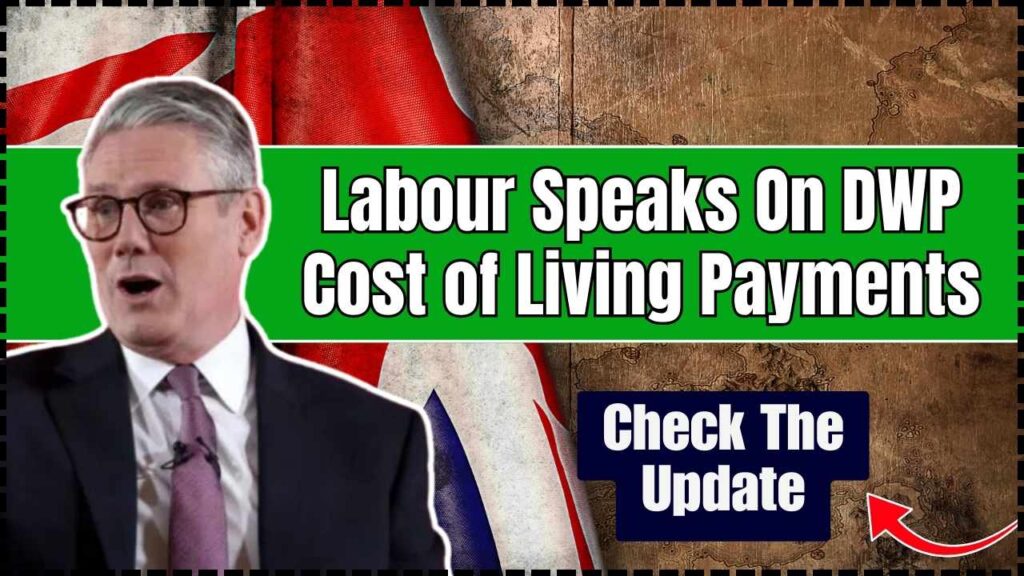Labour Speaks On DWP Cost of Living Payments: As the UK grapples with a rising cost of living, the Department for Work and Pensions (DWP) has introduced various cost of living payments to support citizens struggling to make ends meet. However, as these payments continue to be issued, there has been ongoing debate over their sufficiency and long-term effectiveness. The Labour Party has been vocal in its stance on this issue, offering both praise and criticism for the government’s approach to addressing the crisis.

In this article, we’ll break down Labour’s position on the DWP cost of living payments, explain what these payments are, and explore the wider context of this ongoing economic challenge. Whether you’re a concerned citizen, a policymaker, or simply looking to understand the issue better, this guide will provide you with essential insights into the current cost of living support in the UK.
Labour Speaks On DWP Cost of Living Payments
| Topic | Details |
|---|---|
| DWP Payments | One-off payments to individuals facing financial hardship due to rising living costs, such as inflation |
| Labour’s Response | Labour calls for a more robust, long-term solution, including Universal Basic Income (UBI) and indexed benefits |
| Total DWP Payments (2023) | Over £900 million paid to eligible citizens in 2023 |
| Current Support Amounts | Payments range from £150 to £500 depending on eligibility |
| Next Scheduled Payment | Expected to be paid out in October 2025 |
| Official Source | Gov.uk |
As the cost of living continues to rise, both the government and the Labour Party are under pressure to deliver sustainable solutions. While the DWP cost of living payments offer essential short-term relief, Labour’s proposals highlight the need for broader, long-term reforms to tackle poverty and inequality. By staying informed about available support and considering potential policy changes, citizens can better navigate the financial challenges they face.
What Are DWP Cost of Living Payments?
The Department for Work and Pensions (DWP) provides cost of living payments to eligible citizens as part of the government’s efforts to help those struggling with rising inflation and other economic pressures. These payments are designed to provide immediate relief to individuals and families who need extra financial support to cover essential expenses like food, utilities, and transportation.
The payments are generally available to individuals who are receiving certain government benefits, including Universal Credit, Pension Credit, and Income Support. The amount received depends on income levels, the type of benefit claimed, and whether individuals have dependents or other specific needs.
For instance, in 2023, the DWP cost of living payments ranged between £150 to £500, based on eligibility. While these payments have been a crucial short-term solution, they do not fully address the broader financial challenges faced by many citizens.
Labour’s Position on DWP Cost of Living Payments
The Labour Party has weighed in on the DWP cost of living payments and has expressed concerns about the government’s reliance on one-off payments as a long-term solution. Keir Starmer, the leader of the Labour Party, and Jon Ashworth, the shadow work and pensions secretary, have both raised points about the inadequacy of these payments and the need for more sustainable support.
Key Criticisms of the Labour Speaks On DWP Cost of Living Payments
- Short-Term Focus: Labour has emphasized that while the DWP cost of living payments offer temporary relief, they do little to address the long-term structural issues that lead to poverty. These payments, according to Labour, are band-aid solutions that don’t fix the root causes of financial hardship.
- Inadequate Amounts: Labour has also pointed out that the current payment amounts—while helpful—are not enough to keep up with rising inflation and living costs. According to Labour, payments should be larger, particularly for vulnerable groups like the elderly, single parents, and individuals with disabilities.
- Lack of Indexation to Inflation: Labour has called for benefits to be indexed to inflation so that support rises automatically in line with the cost of living. Without this, they argue, benefits become outdated and fail to provide sufficient support as prices rise.
- Increased Eligibility Thresholds: Another point Labour has raised is the eligibility criteria for these payments. Currently, many people who fall just above the threshold for receiving DWP benefits are left out, despite facing financial difficulties. Labour has suggested increasing the eligibility limits so that more people can access support.
Labour’s Proposed Solutions
Labour has put forward several proposals aimed at addressing the cost of living crisis on a long-term basis, including:
- Universal Basic Income (UBI): One of Labour’s more ambitious proposals is to explore a Universal Basic Income—a system where all citizens receive a guaranteed income from the government, regardless of their employment status. This would provide a more stable financial foundation for all citizens, particularly in times of economic uncertainty.
- Increase the Minimum Wage: Labour has suggested that the government should focus on raising the minimum wage to ensure that people are earning enough to meet basic living costs without needing to rely on one-off government payments.
- Housing and Energy Reforms: In addition to payments, Labour has advocated for reforms to make housing more affordable and energy costs more manageable for low-income families. They argue that tackling the cost of housing and energy will provide long-term relief for citizens.
DWP’s Response to Labour’s Criticisms
The DWP has responded to Labour’s criticisms by defending its current approach. Minister for Welfare Delivery, Will Quince, explained that the cost of living payments are a temporary response to immediate needs caused by the cost-of-living crisis. According to Quince, these payments are only one part of a broader strategy to support citizens, which also includes increases to Universal Credit and Pension Credit.
Key DWP Initiatives for Ongoing Support:
- Universal Credit Increases: The government has raised the amount of Universal Credit available to those in need. This ensures that low-income families have a baseline level of financial support to meet their needs.
- Affordable Housing Investments: In an effort to address long-term housing affordability issues, the government has committed to increasing the supply of affordable homes for families in need.
- Winter Fuel Payments: For older citizens and vulnerable households, the DWP provides winter fuel payments to help cover the costs of heating during the colder months.
Despite these measures, critics have pointed out that these solutions do not go far enough to tackle deep-rooted inequalities in society.
Global Context: How Do Other Countries Tackle Cost of Living Crises?
The UK’s cost of living payments are part of a broader trend of governments offering direct cash transfers and other relief measures in response to economic hardship. Countries around the world have adopted various strategies to support their citizens during times of crisis.
For example, Canada introduced the Canada Emergency Response Benefit (CERB) during the COVID-19 pandemic, providing temporary income support to workers who lost their jobs. Similarly, Finland has experimented with Universal Basic Income (UBI) as part of a long-term solution to reduce poverty and inequality.
The United States has also implemented stimulus checks and expanded unemployment benefits in response to economic downturns, although many argue that these measures were insufficient and lacked the long-term vision needed for sustained economic recovery.
Labour’s support for UBI aligns with this global trend, with many progressive economists arguing that Universal Basic Income could provide a safety net for everyone, helping to reduce poverty and inequality.
Loughborough University Offers Global Excellence Scholarship for 2025: Check Details!
Practical Tips for Beneficiaries: Maximizing Available Support
While the debate over the effectiveness of cost of living payments continues, there are several practical steps that beneficiaries can take to ensure they are making the most of the available support.
1. Keep Your Information Up-to-Date
Ensure that your contact details, bank information, and personal records are up to date with the DWP. If any of this information changes, your payments may be delayed or disrupted.
2. Apply for All Available Benefits
In addition to the cost of living payments, there are other benefits available, such as Pension Credit, Child Tax Credits, and Housing Benefits. Make sure you are receiving all the support you qualify for by checking your eligibility and applying.
3. Explore Local Community Resources
Many local charities, food banks, and community organizations offer additional support. These resources can help with things like groceries, energy bills, and even school supplies for children.
4. Stay Informed About Policy Changes
Government policies and benefit eligibility criteria can change frequently. Stay informed by checking official sources like the gov.uk website and SASSA updates for the latest news on available support.
FAQs On Labour Speaks On DWP Cost of Living Payments
Q: Who is eligible for DWP cost of living payments?
A: The payments are available to individuals receiving certain benefits, including Universal Credit, Pension Credit, and Income Support. Eligibility criteria include income thresholds and specific personal circumstances.
Q: How much will I receive from the DWP cost of living payment?
A: The amount varies depending on eligibility, but payments range between £150 and £500.
Q: Will Labour’s proposals help the cost of living crisis?
A: Labour’s proposals, such as Universal Basic Income and minimum wage increases, aim to address the root causes of poverty, but their implementation would require substantial policy changes and government investment.
Q: Where can I find more information about DWP payments?
A: For more details, visit the official DWP website or contact their helpline.






